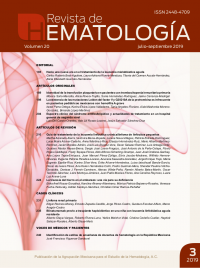The crossing of iron in pregnancy: a way to its deficiency.
Rev Hematol Mex. 2019 julio-septiembre;20(3):224-230. https://doi.org/10.24245/rhematol.v20i3.3279
Erika Areli Rosas-González,1 Karolina Álvarez-Altamirano,2 Mónica Patricia Bejarano-Rosales,2 Vanessa Fuchs-Tarlovsky,2 Adrián Santoyo-Sánchez,4 Christian Omar Ramos-Peñafiel3
1 Maestría en Ciencias de la Salud, Escuela Superior de Medicina, IPN, Ciudad de México.
2 Servicio de Nutrición Clínica.
3 Servicio de Hematología.
Hospital General de México
4 Facultad de Medicina, Universidad Nacional Autónoma de México, Ciudad de México.
Resumen
El hierro es uno de los elementos más abundantes en la tierra, en el ser humano participa en muchos procesos biológicos. En el embarazo el requerimiento de hierro aumenta y es por medio de la placenta que la madre abastece al feto. En todo el mundo 40% de las mujeres embarazadas padecen anemia, por lo que su metabolismo materno-fetal juega una parte importante en el entendimiento de la fisiopatología de la enfermedad y posible terapéutica. La baja ingesta, predisposición y la inadecuada administración complementaria son factores que intervienen en la alta prevalencia de anemia y deficiencia de hierro en esta etapa de la vida. En este artículo de revisión se describe la epidemiologia, metabolismo y principales mecanismos por los que se conduce a la deficiencia del metal más importante de los sistemas biológicos: el hierro.
PALABRAS CLAVE: Hierro; anemia; embarazo; hepcidina; nutrición; dieta.
Abstract
The iron is one of the most abundant elements on Earth, in humans it participates in many biological processes. During pregnancy the iron requirement is increased, and the mother’s placenta is the way through to provide the supply to the fetus. Worldwide, 40% of pregnant women suffer anemia. Therefore, their maternal-fetal metabolism plays an important part in the understanding of the pathophysiology of the disease and possible therapy. The low intake, predisposition and inadequate supplementation are factors that intervene in the high prevalence of anemia and iron deficiency in this stage of life. In this review article, we will describe the epidemiology, metabolism and main mechanisms by which the deficiency of the most important metal of biological systems is led: iron.
KEYWORDS: Iron; Anemia; Pregnancy; Hepcidin; Nutrition; Diet.

